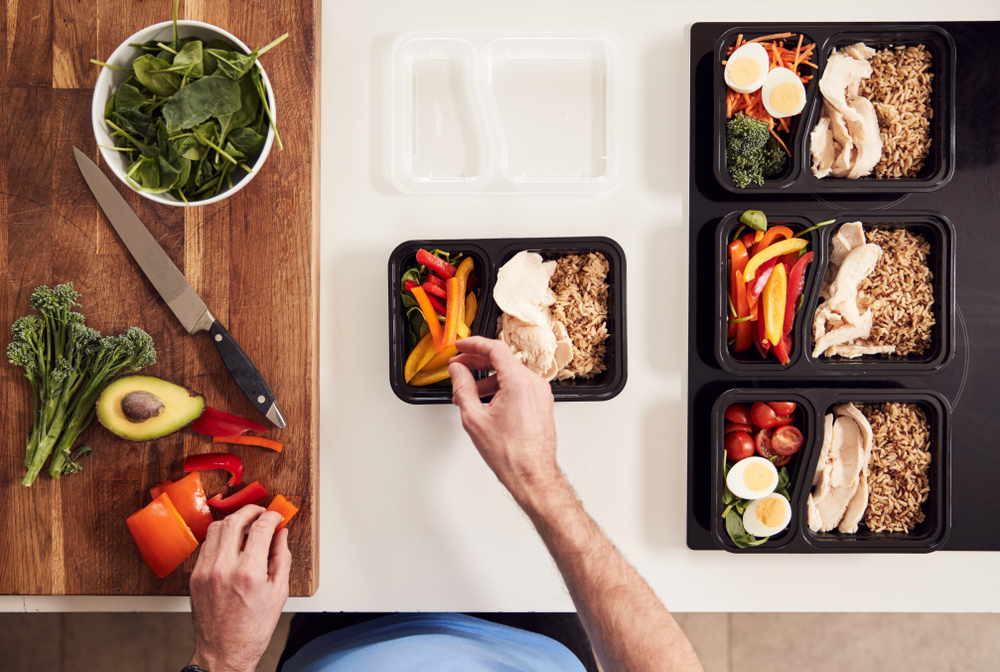SEARCH BLOG POSTS

Meal Timing: Should You Eat Before or After a Workout?
Nutrition and exercise go hand in hand, but balancing the timing of the two can be confusing. Almost every day, we hear the same question: “Should I eat before or after the gym?”
Meal timing is an important aspect of your overall fitness regimen. Our guide will help you decide if you should eat before or after a workout and discuss various factors to consider when creating a diet and fitness schedule. We also recommend working with a nutritional counselor and a fitness coach to develop a safe and goal-focused plan.
If you have questions, simply contact our team. We’re happy to help you with all your fitness needs!
The Starting Line: Understanding Workout Nutrition
Is it better to eat before or after a workout, and why?
Truth be told, there is not just one answer to this question. A lot of it depends on specifics. Workout nutrition and timing are unique to individual circumstances, like athletic goals, the type of exercise, lifestyle, diet, and other health factors.
We generally recommend that athletes eat something in the hours surrounding their workout, whether before, after, or both. This is the safest, healthiest practice and the best way to encourage post-workout recovery and muscle growth.
Pre-Workout Fuel: Things to Consider
As long as you give yourself enough time to digest, food can be very beneficial ahead of a workout—but in some cases, it may not be necessary. A lot of this comes down to your personal preferences and routine. Whether or not you eat before a workout may depend on several circumstances, including:
-
Digestion Timing
While eating before a workout can be beneficial, it requires proper digestion time. Exercising too soon after eating can lead to gastrointestinal discomfort. Nobody wants that, especially not during a workout! However, this can cause a dilemma for early birds who hit the gym in the morning before work.
In general, it’s best to wait 30-60 minutes between eating and exercise. While your body may not have completely digested everything by then, it will at least have some time to process the food. Some more intensive workouts may require a longer digestion period.
-
Type of Workout
Pre-workout fuel may be necessary for some workouts but not others. For instance, athletes who perform longer-duration workouts (over an hour) may need to eat before exercising, while folks who crush short, intensive sessions like HIIT might not.
-
What You Eat
Some foods, like oats, legumes, and bananas, can naturally provide energy. As long as you give yourself enough time to let these foods settle in your stomach, they can provide the right amount of fuel before a workout. If that sounds like your ideal pre-workout meal, go for it. However, if you just ate a spicy fast food lunch and an energy drink, it might be best to wait to work out until several hours have passed and you’ve completely digested it.
-
Preferences/Needs
Some people struggle to work out on an empty stomach and feel too weak to exercise properly. Others don’t have this issue, and they may even be prone to discomfort or nausea if they hit the gym after a meal. Our best advice is to follow your personal preference and make adjustments to adhere to those needs if necessary.
Post-Workout Nutrition: Refueling for Recovery
Most athletes and experts agree that consuming certain nutrients, like protein and fibrous carbohydrates, is important after a workout. It is crucial for proper post-workout recovery, which is necessary for your health, safety, and muscle growth.
Some athletes chug a protein shake or chow down on a bar as soon as they finish their sesh. However, some people don’t have a huge appetite right after leaving the gym. If that sounds familiar, don’t stress. While it’s important to get those nutrients in after a workout, it doesn’t need to be done ASAP. You can go home and allow your appetite to develop naturally. As long as it’s within a couple of hours of your workout, you’ll get the necessary nutrients for recovery.
Personalizing Your Plate: What to Eat?
Timing is an important element of exercise and nutrition, but it’s certainly not the only one. What you eat before or after a workout also matters. This is why it’s important to discuss your eating habits and nutrition with a professional. They’ll be able to offer tips to start eating healthy and help you develop habits that align with your goals.

Fueling Your Fitness Journey: Practical Tips and Takeaways
Should you eat before or after exercise? As you’ve learned from this article, the answer depends on various factors. Your workout meal plan should revolve around your personal needs, health, and goals.
To help you determine what will be best for you, consider the following tips.
-
Think About Portions
Portion size makes a difference, especially if you’re planning to eat before working out. While many athletes find it advantageous to eat one to two hours before exercising, they usually don’t chow down on a full meal. While a big plate of food can provide lots of helpful energy, it can be too much to digest in that time period. This can cause some temporary (but still very undesirable) stomach and digestive issues. Instead, we recommend eating a small meal or snack that features complex carbs and protein.
-
Consider Goals
Your specific goals will determine what your nutritional plan will look like in terms of both timing and diet. For instance, if you are entering a bulking period, you’ll want to curate a diet that increases your caloric intake. Once you develop a meal plan centered around your goals, you can create a complementary workout schedule. This makes it easier to find the appropriate meals or snacks for your needs. That might mean a high-cal snack an hour ahead of a lifting session and a hearty meal an hour after you go home, or it could just mean a big protein shake on the drive away from the gym. It all depends on your unique circumstances.
-
Eat Well
Feed your body well. This doesn’t necessarily mean restricting certain items. The focus should be on eating a balanced diet that includes all the nutrients and food groups necessary to be the healthiest version of yourself. This is important whether it’s a gym day or not.
-
Listen to Your Body
When something doesn’t feel right, don’t push it. If you’ve eaten a pre-workout meal and still don’t feel you’ve digested enough to hit the gym, hold off. If you usually crush a big plate of protein right after a bodybuilding session but feel a bit hot and dehydrated today, focus on water first, and then eat something when you’re ready. You know your body best. Listen to what it says!
-
Take Professional Advice
Struggling to develop an appropriate meal plan that works with your fitness regimen? That’s natural. Nutrition is a fascinating subject but also a dense one. Food and nutrition are prone to myths and misinformation on social media. This misinformation can lead to dangerous diet trends, and they can be unsafe, especially when combined with exercise. That’s why it’s so important to work with a professional.
A qualified nutritional counselor or dietician understands the science behind food. They will have accurate nutritional information and can provide customized advice that aligns with YOUR body, health, goals, and existing routine.
Have More Questions About Eating Before or After a Workout?
We have answers. At Jack City Fitness, we offer exclusive access to some of Boise’s most knowledgeable and experienced fitness coaches and nutritional counselors. These pros are extensively trained and qualified in specialized health fields and are thrilled to share their expertise with local athletes. They’ll optimize the way you approach health and fitness and answer any specific questions you have about meal timing, nutrition, and exercising for goals.
To learn more about Jack City, contact us at (208) 999-1111. We’ll invite you to our gym for a FREE fitness consultation and a chance to meet our counselors and coaches to see if they’re a good match for your needs. If you choose to become a Partner, you’ll have immediate 24/7 access to our facilities!
We can’t wait to meet you and help you reach your goals.
Additional Sources:
https://www.mayoclinic.org/healthy-lifestyle/fitness/in-depth/exercise/art-20045506
https://www.bhf.org.uk/informationsupport/heart-matters-magazine/nutrition/food-for-fitness
